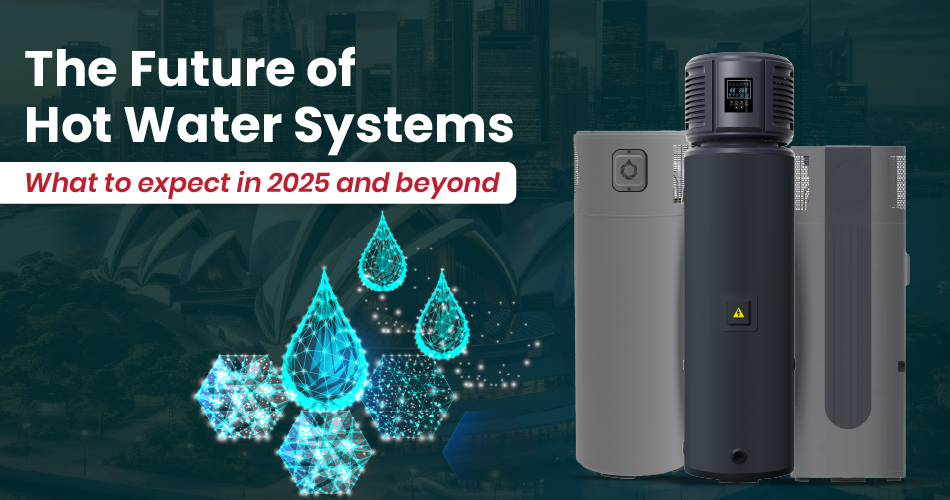The landscape of hot water systems in Australia is experiencing a significant transformation, driven by a combination of environmental awareness and rising energy costs.
As more Australian households prioritize sustainability, they are moving away from traditional gas and electric water heaters in favor of greener, more energy-efficient solutions.
In particular, heat pump technologies are gaining momentum due to their ability to harness ambient heat and convert it into energy to heat water, reducing both energy consumption and greenhouse gas emissions.
Looking towards 2025 and beyond, advancements in both electric-powered and heat pump hot water systems are expected to dominate the market.
These systems are designed to meet the growing demand for efficiency without sacrificing performance. Not only do they help in minimizing environmental impact, but they also offer long-term savings for homeowners by drastically reducing electricity usage.
With an ever-increasing emphasis on sustainability and governmental support through rebates and incentives, the future of hot water systems is steering firmly toward heat pumps.
The Shift from Gas to Electric-Powered Hot Water Systems
Gas-powered hot water systems have long been the go-to option for many homes in Australia. However, they are gradually becoming less cost-effective due to rising gas prices and the push for more sustainable energy solutions.
Electric-powered hot water systems, particularly heat pump water heaters, are emerging as a superior alternative due to their efficiency and lower emissions.
Governments and organizations like ARENA (Australian Renewable Energy Agency) have recognized the benefits of these systems and are actively promoting them through various hot water heat pump rebates.
Switching from gas to electric or heat pump systems offers both financial and environmental benefits.
Not only do electric systems reduce your carbon footprint, but they also offer long-term savings through lower operational costs.
Additionally, with more incentives and rebates available, homeowners are finding it increasingly affordable to make the switch as part of a hot water system upgrade.
What Makes Hot Water Heat Pumps the Future?
Heat pump technology stands out as one of the most promising hot water system trends. Heat pumps work by extracting heat from the surrounding air and transferring it to heat the water.
If this hot water system trend continues, the future of heat pump technology is expected to play a central role in shaping hot water systems by 2025, as they offer up to 60-70% savings on energy bills compared to conventional systems.
Unlike gas systems, which burn fuel to generate heat, heat pumps are a far cleaner option. They reduce greenhouse gas emissions, making them the environmentally responsible choice.
Moreover, modern heat pumps are built with advanced sensor technologies and smart controls, allowing homeowners to monitor and optimize their energy usage, further enhancing savings.
The Financial Outlook for Homeowners by 2025
By 2025, homeowners who switch to heat pump can expect substantial financial benefits.
Government incentives, such as the hot water heat pump rebate, are making it more affordable for Australians to transition to these energy-efficient systems.
These rebates reduce the upfront cost of installation, and the long-term energy savings make heat pumps a smart financial investment for any household.
In fact, homeowners who have already made the switch report savings of hundreds of dollars on their annual energy bills. The future of heat pump is bright!
HiTech Hot Water has built a reputation for delivering reliable, energy-efficient hot water heat pump as a solution across various Australian homes.
Their focus on customer satisfaction, adaptability to unique situations, and expertise in heat pump technology have made them a preferred choice for hot water system improvements.
Why Heat Pumps Will Dominate the Market by 2025
The future of hot water systems in 2025 is likely to be dominated by heat pumps for several reasons. First, they are far more energy-efficient than traditional systems, using up to 70% less electricity to heat the same amount of water.
This translates into significant cost savings for homeowners, making heat pumps the most cost-effective solution over the long term.
Second, with the push for a low-emissions future, Australia is encouraging the adoption of sustainable technologies like heat pumps.
As more homeowners make the switch, the demand for gas-powered systems will decline, making them less common.
Lastly, advancements in heat pump technology—such as quieter operation, better efficiency in colder climates, and smart integration with home automation systems—make them an even more attractive option for modern homes.

Conclusion: Take the Next Step
The future of hot water systems is shifting towards more sustainable, efficient, and financially viable solutions.
Heat pump water heaters are poised to be the best option for Australian homeowners, offering unparalleled energy savings, environmental benefits, and long-term financial returns.
With incentives like the hot water heat pump rebate available, there has never been a better time to consider upgrading your hot water system.






